Each year at Dasara, Malleswaram 8th Cross turns into a vibrant, festive street, owing to its many temples and commercial areas. It attracts thousands of people each day from all over the city. However, this year, the same packed streets pose a health hazard for residents and visitors due to the potential for spread of COVID.
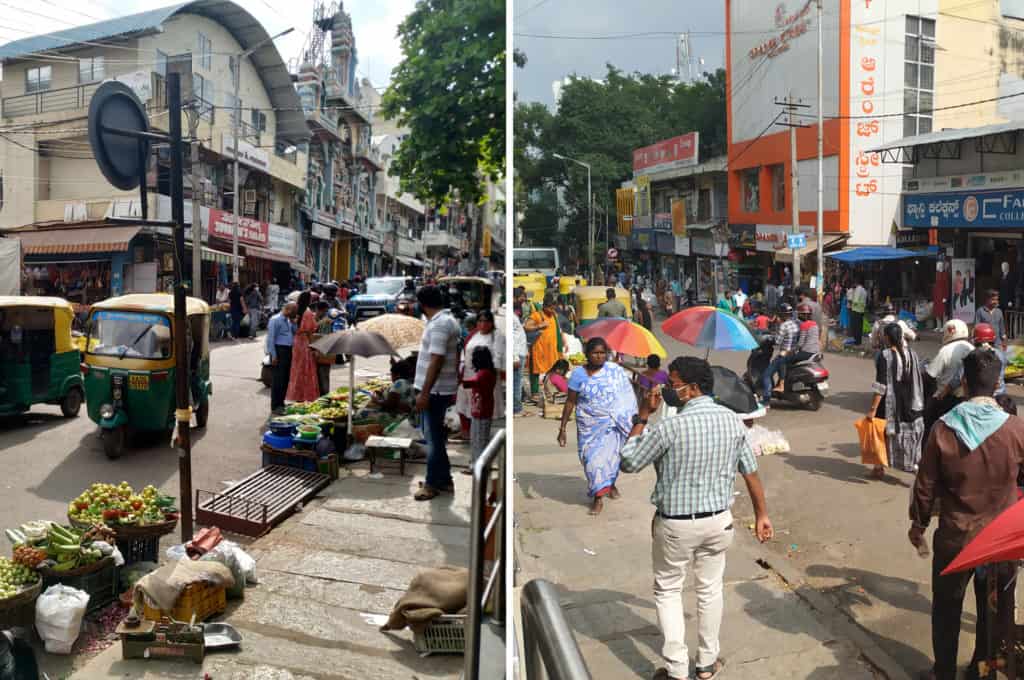
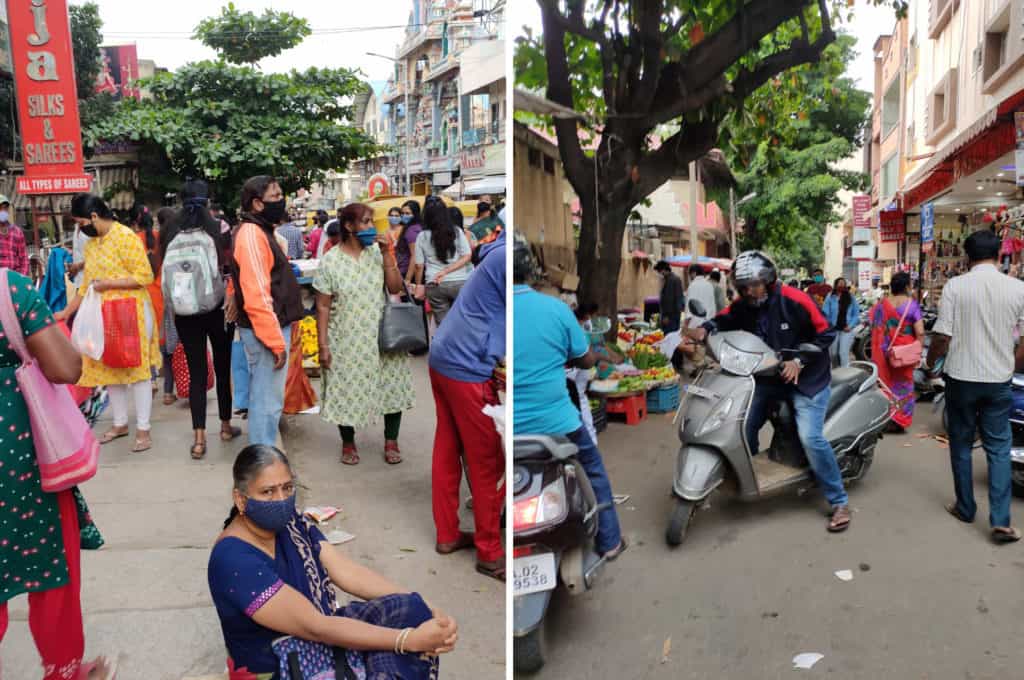
Keeping this in mind, Malleswaram Urban Living Lab – a collaboration between Malleswaram Social, a resident community group, and Sensing Local, an urban do-tank – has been working on interventions that can facilitate better safety protocols such as thermal checks, social distancing and better hygiene. While Dasara was the principal impetus for us, , our concerns span the various festivities that will continue till the New Year.
For M-ULL, it has also been a culmination of a series of smaller initiatives undertaken since July to make the neighbourhood safer during this pandemic. This has included four key projects:
- Assessing implementation of hand sanitising stations at high risk areas in the ward, and identifying the most optimal product to scale
- Evaluation of compliance of SOPs (Standard Operating Procedures) in shops and local businesses, to identify their challenges and the nature of support system required to ease implementation
- Identifying hurdles towards 100% adoption of masks in public spaces and what is needed to remove those
- Understanding the new and existing challenges to the SWM (Solid Waste Management) systems in the ward, and creating a support and monitoring network.
With regard to creation of the 8th Cross plan for a ‘COVID SAFE STREET’, M-ULL took three key steps:
1. On-field surveys and mapping
This was to understand the context and existing behavioural trends. It included in-person surveys (minimum 30% sample size) that were conducted with 23 of the 66 shops on 8th Cross, and 33 of the approximately 100 vendors who locate themselves on the street.
The data sets captured were the level of compliance of SOPs, their challenges in implementing them, general level of individual concern and willingness to implement COVID safety measures. Of greater concern is the fact that the total number of vendors is expected to rise to more than 300 during festival time.
The volunteers also conducted photo documentation, mapping the different types of businesses and measurement of street sections. This was to understand entry points to 8th Cross, space available for vehicle movement, walking, various types of vendor stalls, parking, etc.
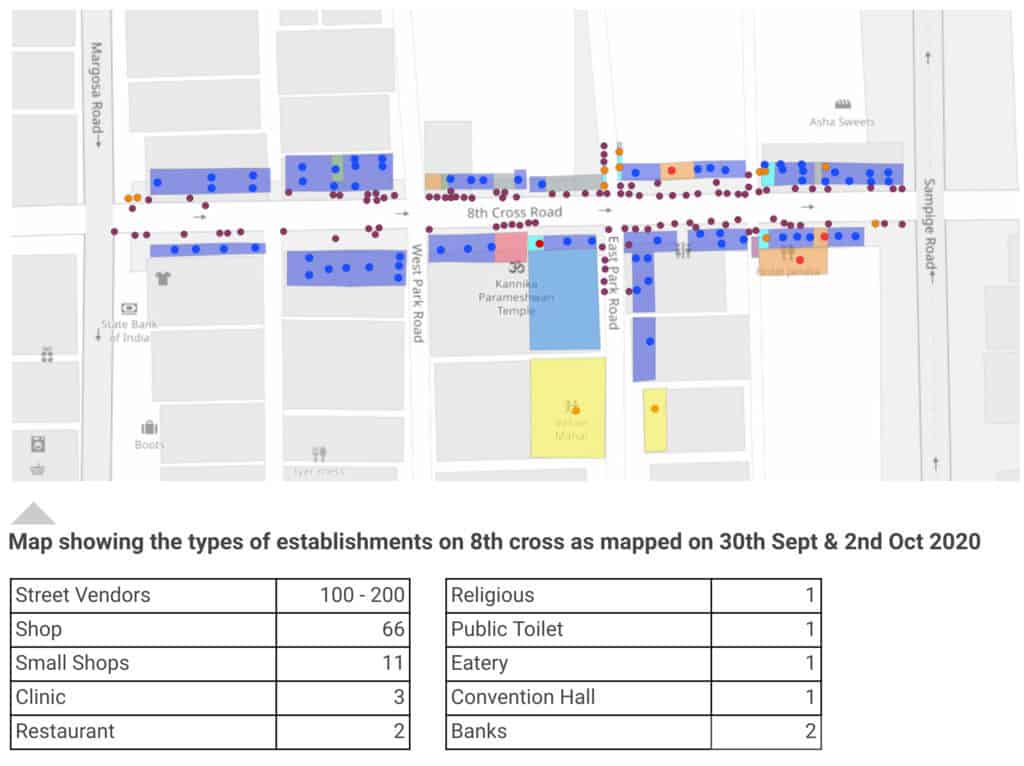
The in-person surveys showed that approximately 90% of shops and vendors were concerned about the spread of COVID. However, with regard to safety advisories, compliance of social distancing, regulating the number of people, display of awareness material, temperature checks and common hand sanitation, remained low. On the flip side, the biggest challenge for businesses was customers being lax and not complying with safety protocols.
Survey results:
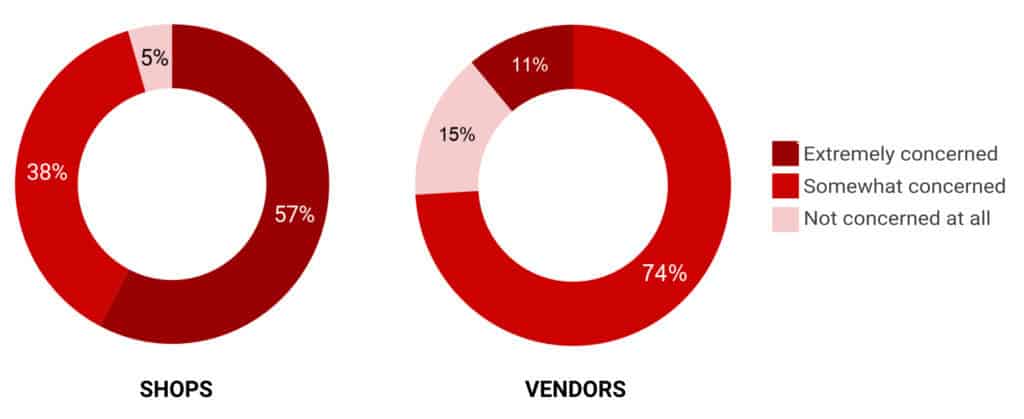
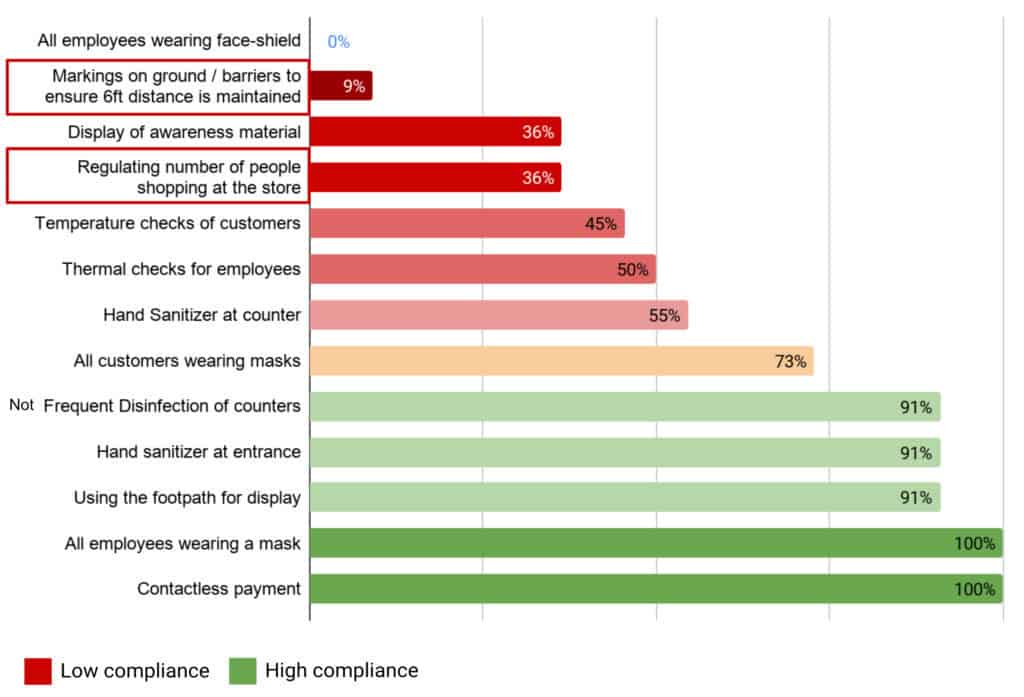
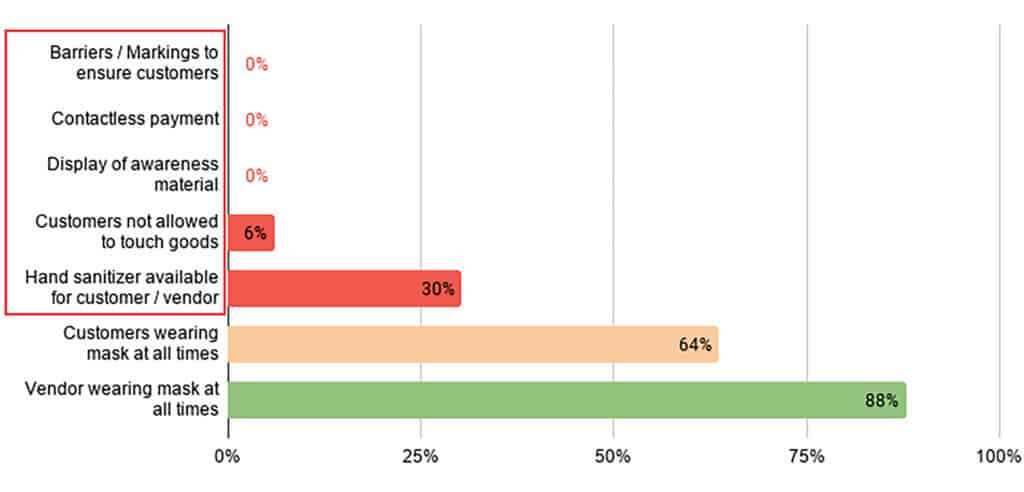
2. Consultation with key stakeholders
Alongside the survey, M-ULL also undertook identification and consultation with key stakeholder groups. Stakeholders for 8th Cross primarily consist of shop owners, vendors, shoppers, traffic police, BBMP, Ward Nodal officer and the MLA. The shopkeepers are organized as an association called Malleswaram Commercial Forum (MCF), while there are several groups that represent the vendors
Consultations were carried out independently with MCF and a representative of a vendors’ association to understand their concerns, impressions and to seek support for the plan to create a COVID Safe Street.
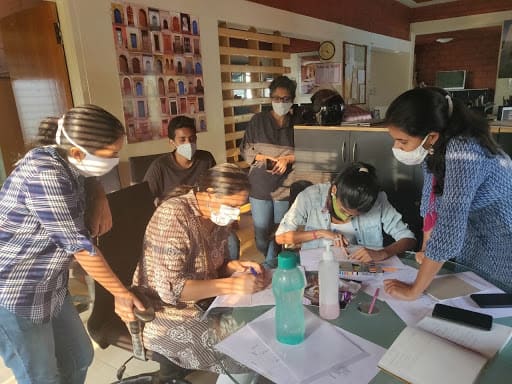
3. 8th Cross ‘COVID SAFE STREET’ plan
Based on the survey inputs, spatial analysis and scenario building, we identified five key actions to help make Malleswaram 8th Cross COVID-safe:
- The main market street should be pedestrianised to create safe distancing for shoppers and for regulating mobility
- There should be thermal checks at all the entrances
- Vending zones should be marked along the market street to ensure social distancing
- Hand-sanitation stations should be regularly placed along the footpath
- A ‘No-mask, no-entry’ policy should be strictly enforced
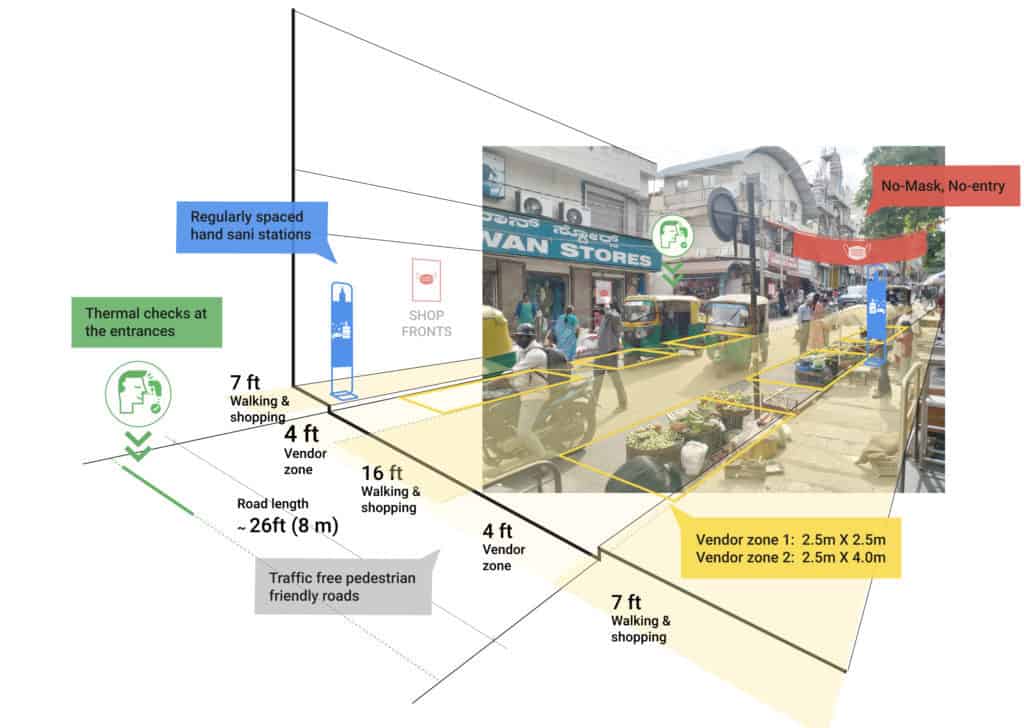
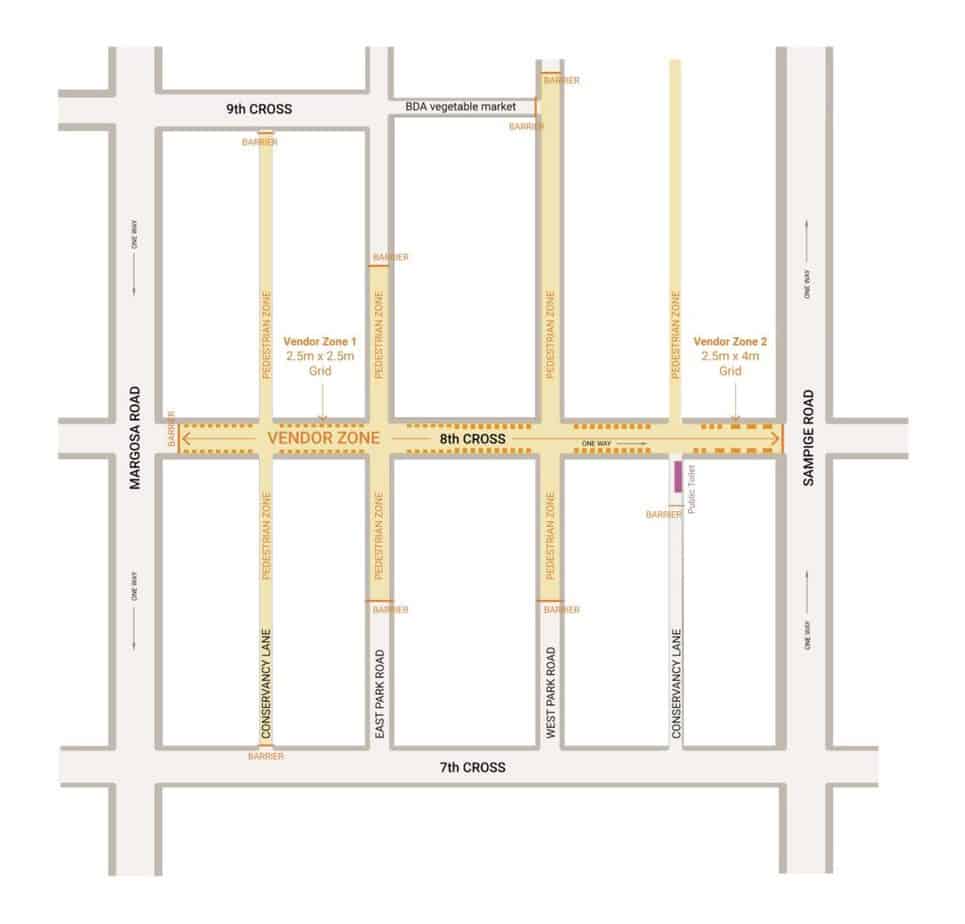
A point to note here is that pedestrianisation of 8th Cross alone is not enough; other by-lanes also need to be regulated for entry and parking.
With respect to vending zones, two sizes have been considered:
- Vending Zone 1: 2.5m X 2.5m (1.5m x 1.5 m for vendors, with 1m buffer in front for the customer and 0.5m on either side). This would suffice for those like fruit, vegetable and flower vendors.
- Vending Zone 2: 2.5m x 4.0m (1.5m X 3.0m for vendors, with 1m buffer in front for the customer and 0.5m on either side). This would suffice for clothes sellers who tend to require a larger space.
The major point of contention continues to be pedestrianisation of the street to create adequate room for shoppers and vendors. There is fear among shop owners that pedestrianisation will prevent bulk shoppers in particular from getting their cars into the street. In addition, there is a no-parking plan for the market area.
Alternative plans such as creating a safe zone for vendors at Malleswaram grounds was also debated. But vendors also don’t want to move to the Malleswaram grounds due to anxiety of losing customers.
Current status
The festival plan for 8th Cross, Malleswaram was further discussed on October 14 at a joint meeting with the Executive Engineer (EE) from BBMP and the Circle Inspector, to understand the measures to be taken and the process that needs to be followed to realise them. It was decided that they will assess the on-ground situation till October 21, before attempting to implement some of these measures. M-ULL continues to follow up with the other stakeholders on an almost daily basis.
It must be stated, the current BBMP SOPs for festival time as released on October 14 mainly cater to event-based festivities and do not address commercial streets. They also do not specify what shop owners, vendors, local residents and government officials need to do from a task perspective. This is a huge lacuna in the directive, and as such, robs it of any punitive quality in case of non-compliance.
Since the government is the key implementation agency here, with coordination required among BBMP and Traffic Police, the need of the hour is a step-by-step participatory planning template for stakeholders in commercial areas like the Malleswaram market to collaboratively create individual, contextualized ‘COVID SAFE STREET’ plans.
Failure to do so can result in a surge in infections during the festival period, something we can ill afford at this time.
[Both the authors are part of Malleswaram Urban Living Lab.]
All these are as cosmetic as they can be. I have been commenting and writing on this for decades now. The fact is that no one is interested in solving the problems. All want short term band aid type solutions and seem to be happy with it. If we take pride in our mistakes and blunders, and brag about them that is the be all and end all of all sensible arguments.
“Failure to do so can result in a surge in infections during the festival period, something we can ill afford at this time” This is the last sentence of the article and mirrors what I wanted to say after reading the blog. There is a saying in Kannada “dinaa saayuvavarige aluvavaru yaaru?”. Do not heed to advices like ‘we have to learn to live with covid”. Be careful. If you are alive and when covid has gone, you can enjoy better. If you are dead by catching covid at 8th cross or 18th cross, your own people will not come near you, choice is yours. Be sober in your decisions.
‘@Mr Sastry
Just writing won’t help. Some concrete actions are needed. This is what this article and the initiative demonstrates. Very good initiative involving all the stakeholders(vendors) and the government officials that too at the right time.